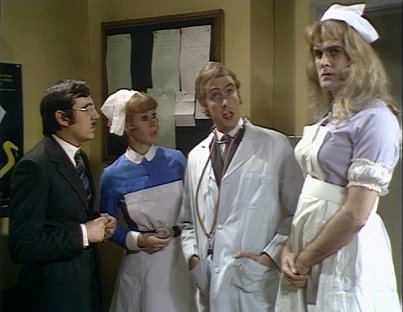
Let me lead off the discussion of Her Majesty’s National Health Service with an interesting op-ed by Mr. Stephen Glover:
In it, Glover does an appreciable job knocking down some of the sillier rumors about health care in the UK whilst (whilst!) affirming that it’s not all lollipops and zero-quid bills on the other side of the pond. (Captain Obvious alert: dentistry is a particular problem.)
Glover’s strongest, most essential allegation is this: “Under the present system which President Obama is hoping to improve, most middle-class Americans are liable to receive better health treatment than their British counterparts.” He offers a personal anecdote—I hate personal anecdotes—and suggests that an American would be shocked by the NHS’s “squalor, and looming threat of MRSA; the long waiting lists, and especially the official target that patients in ‘accident and emergency’ should be expected to wait for no more than four – four! – hours; the sense exuded by some medical staff that they are doing you a favour by taking down your personal details.”
Well, squalor, maybe. Waiting lists are of course a flashpoint. But MRSA is an issue at hospitals around the world, and a four-hour guideline for emergency treatment is far superior than many big-city US hospitals might be able to offer.
Let me not start shooting down his points right away, though. There are indeed awful examples of poor treatment in British facilities (I found this example just this hour). As a whole, how does the NHS do?
Here’s another good and fair article examining some of the loony (and not so loony) claims about British health care. Like Stephen Glover, the numbers on cancer survival seem to be the most damning statistics, though I feel like I might have explained those in my very first blog post. Others, though, stick out: “‘Some people with serious kidney failure are unable to obtain dialysis on the NHS and die,’ said Tim Statham, chief executive of the National Kidney Federation.” Ouch.
So it’s very far from perfect. Read here if you want even more. Then again, click that link and read the first paragraph: people generally LOVE the NHS, and the numbers are the best when you ask people who’ve actually received treatment.
Let me stop holding back—the UK is a great place to have health care. Any person “ordinarily resident” in the UK is eligible for free care. You pay for the following:
- £7.20 per prescription (exemptions for the old, young, poor, and some others)
- Dentistry charges (ranging from £16.50 for a basic exam to £198 for a major procedure)
- £19.32 for an eye exam with a range of low-cost optical products available
- Car parking charges at hospitals
- “Since January 2007, the NHS have been able to claim back the cost of treatment, and for ambulance services, for those who have been paid personal injury compensation.”
And that’s it! Go have massive brain surgery for all I care, you’re still only paying for your prescriptions and your car parking.
Yeah, but it’s gotta be like crazy in debt, right? Well, generally, no. The good news is the NHS is REQUIRED to break even every year. The bad news is it’s not quite pulling it off, with an estimated deficit of £7 billion as of 2010 (that’s 7.5% of its £94 billion annual budget). Wikipedia’s kind of sparse as to information here, and Googling didn’t help much, but I suspect £7 billion is a total deficit, not an annual defiict as Wikipedia claims. (Total debt was £1.3 billion as of two years ago.)
Weeeell, how about end-of-life care and rationing? It’s untrue that you can’t get heart surgery after age 59, or whatever the kooks are saying. It’s untrue that Ted Kennedy (or Stephen Hawking) would have gotten inferior care.
It is true that rationing occurs, in a sense; this NYT Magazine article (which I linked to previously) is a good explanation of why that’s a good and necessary thing. Just last weekend I was in Houston as my grandmother agreed not to put my grandfather under expensive brain surgery that, at its best, would increase his life by only a couple of months. Forget the government; would ANY insurance provider agree to cover such a thing?
And there are, as I said before, inevitable stories of substandard care:
Sentenced to death on the NHS
Plenty of fodder exists for those who want to find the NHS a nefarious government-run horror.
But, time and again, the British come to the defence (notice my British spelling) of their beloved system:
In Defense of Britain’s Health System
Brits defend their health care
Indeed, Stephen Glover’s column, with which I led off this post, is the most negative critique of the NHS as a whole that I’ve found from an actual UK resident. And even he doesn’t come off as exceptionally negative about it.
I wouldn’t say that I see more horror stories regarding UK health care than I regarding US health care. I strangely feel a little glad to see it’s not as utopian as many liberals suggest; it’s a real, actual, flawed government system. But here’s one thing: it, covers, everyone.
Yeah, I tend to think most of the people who think the NHS is some utopia are the same people who thought that we’d be seeing the last planeload of soldiers home from Iraq and Afghanistan a few weeks after the inauguration. On the whole, Brits and Canadians seem to have a more calm-headed approach to discussing their health care systems. One benefit mentioned by a Canuck I know is that when doctors are paid a salary as in Canada or the UK, rather than per-procedure as in the USA, there is no incentive to have a procedure done unless it’s medically necessary.